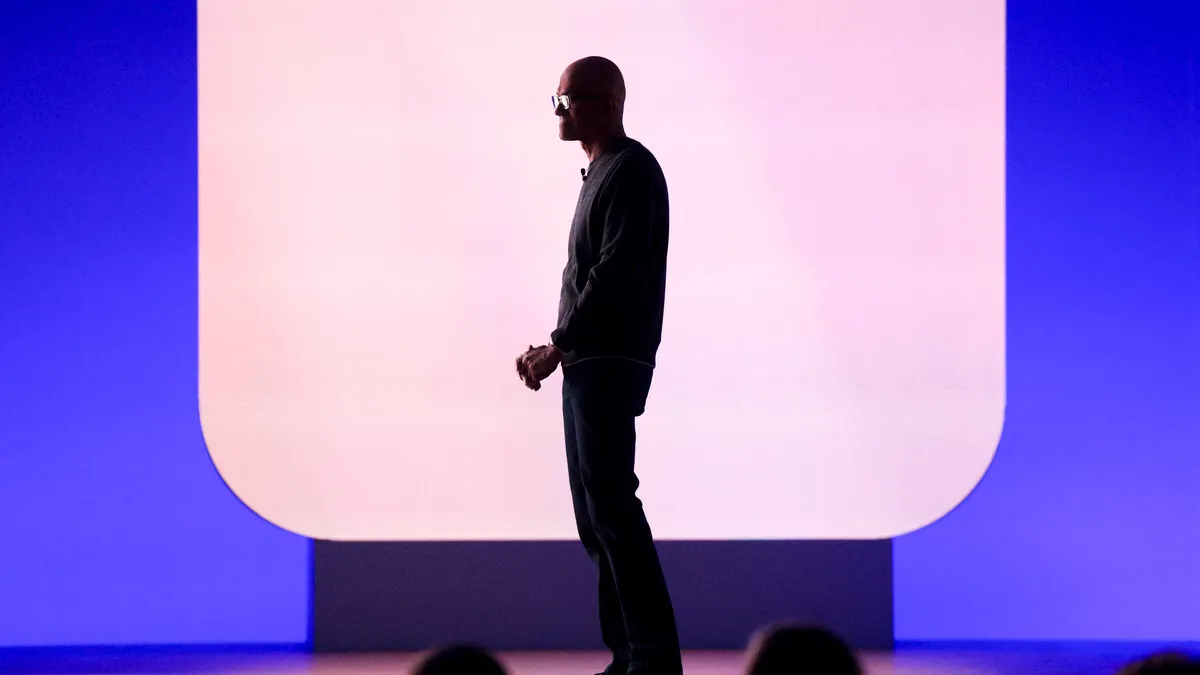By Ed Bott
Copyright zdnet

Satya Nadella is only the third CEO Microsoft has had in its 50 years of existence, which is mind-blowing when you think about it.
Back in 2017, when he was still only a few years into his role at the top of the company’s org chart, Nadella (with the help of a couple of ghostwriters) wrote a book called Hit Refresh, in which he rhapsodized about “us humans and the unique quality we call empathy, which will become ever more valuable in a world where the torrent of technology will disrupt the status quo like never before.”
Also: How to upgrade your ‘incompatible’ Windows 10 PC to Windows 11 – for free today
After decades of the aggressive, take-no-prisoners mentality of his predecessors Bill Gates and Steve Ballmer, the emphasis on empathy seemed refreshing. It’s a theme Nadella has returned to repeatedly in interviews and public speeches during the past decade. In a 2023 interview with publisher Axel Springer, he said, “I don’t think empathy is a soft skill. In fact, it is the hardest skill we learn, to relate to the world, to relate to the people that matter the most to us. In fact, innovation is about meeting the unmet, unarticulated needs of customers.”
Last month, at an employee-only town hall, a current Microsoft employee confronted the CEO directly, arguing that the company is no longer living up to that aspiration. In his Notepad newsletter, longtime Microsoft-watcher Tom Warren quotes that worker, who articulated a common complaint: These days, life at Microsoft feels “markedly different, colder, more rigid, and lacking in the empathy we have come to value.”
“I’ve spoken to dozens of employees over the past few months,” Warren reports, “and they all told me that morale inside Microsoft is at an all-time low.” No wonder, given that the company has conducted five rounds of layoffs so far in 2025, cutting loose more than 15,000 employees, or about 6.7% of its global workforce. And that’s despite the fact that the company is making record profits and is one of the three most successful corporations on the planet.
Also: Microsoft is saving millions with AI and laying off thousands – where do we go from here?
There’s no question Microsoft is facing enormous pressure as it tries to compete in the insanely expensive, ridiculously fast-moving battle to become the leading AI platform. But that pressure is showing up in the company’s interactions with customers. In more than three decades of observing what Redmond says and does, I have never seen Microsoft so aloof, out of touch, and lacking in empathy as it is in 2025. It’s almost like it’s trying to push customers away — especially if those customers are poor and powerless.
I haven’t heard lately from any customers who feel that their “unmet, unarticulated needs” are being met. More often, they feel ignored or that they’re being forced to use and pay for products and features they neither want nor need.
First, there was last year’s shambolic rollout of the AI-powered Recall feature, in which the company forgot to consider the privacy concerns of its customers.
Then, earlier this year, there was the disastrous Microsoft 365 Copilot launch. Existing customers got a sudden 30% price increase, and Microsoft’s marketing droids blamed it on AI. The reaction from customers was brutal. As I wrote at the time, “As far as I can tell, the response from customers has been overwhelmingly negative. I monitor Microsoft-focused online forums obsessively, and I read hundreds of complaints without seeing a single compliment.”
All of the traditional Office apps that are part of Microsoft 365 now sport a Copilot button. Every so often, I try using one of those features in Word or Excel or Outlook, and the results have been spectacularly underwhelming and often comically wrong. They feel like prerelease versions and certainly aren’t enough to justify a 30% price increase. As of earlier this year, Microsoft counted 84 million subscribers to its Microsoft 365 Family and Personal products. The most common request I hear from that group is to make that Copilot button go away.
And then there’s the transition from Windows 10 to Windows 11, in which Microsoft has done the unthinkable, telling hundreds of millions of people that their Windows PCs are obsolete and will no longer receive security updates as of Oct. 14, 2025.
This is a curious decision from a company that has spent the last 23 years talking about its commitment to making its software “secure by default.” The latest whitepaper for the Secure Future Initiative is headlined “Security above all else.” In July 2025, the CEO himself said, “Security and quality are non-negotiable.”
Yeah, let’s talk about that.
You can jump through a few hoops to enroll in a subscription for Windows 10 Extended Security Updates and delay the reckoning for one extra year. The people who are most at risk are also the least likely to understand how to make that happen.
I get emails every week from people (many of them older) who are on fixed incomes and can’t afford to replace their middle-aged but still perfectly functional PC. They lack the technical skills to understand why this is happening and how to preserve their investment. Microsoft appears to have no empathy for them. At 12:01 AM on Oct. 15, those Windows 10 PCs will no longer be secure by default.
Also: Microsoft said these 400 readers couldn’t upgrade to Windows 11. They did it anyway
Once upon a time, Microsoft understood that its value as a company was calculated using a complex equation that included the contributions of hobbyists and enthusiasts and students and retirees and part-time developers whose contributions could not be quantified in incremental revenue. They helped sustain an ecosystem that extended from suburban basements to corporate datacenters. When you take away the amateurs, the market becomes much less interesting.
Redmond appears to be under too much pressure to care about those legacy customers, focusing instead on the deep pockets of its corporate customers, who it believes will pay an extra $30 per seat to add a chatbot to their Microsoft Office — sorry, Microsoft 365 license. That’s the only way Redmond’s crushing investments in AI infrastructure ($80 billion last year alone!) will ever pay off.
Good luck with that. In fact, the economics make no sense for a firm that sells enterprise licenses on a per-seat basis. If the next generation of Microsoft technology is going to help organizations slash headcount by giving the remaining human workers AI-powered tools, that will mean the prices for each license will have to increase just to keep the revenue line flat. And the per-seat price will have to double to pay for all those datacenters.
Also: The 11 Microsoft apps I ditch on every new Windows install – and the 11 I keep
Back in July, shortly after the close of the fiscal year, Nadella wrote an email to the 220,000 or so employees still working at Microsoft. (As a reminder, that number is down more than 15,000 from the start of the year, thanks to layoffs.)
The email was also published to Microsoft’s corporate blog, which might be your first hint that this was really a PR move and not a sincere communication to the employees whose future is in Nadella’s hands.
It’s a remarkable missive, and after reading it, I’m pretty certain that Nadella had help writing it. I am not speaking about the competent PR professionals and legal minds in Microsoft’s corporate HQ, who probably had some limited input.
No, this reads like something that was drafted and reshaped by the Copilot LLM chatbot that has become Microsoft’s obsession these days. It has that cloying, inauthentic tone that most humans can’t match, filled with sweeping language that breaks down when you ask, “What does that mean, actually?” And it wouldn’t surprise me; Nadella has boasted in the past about his reliance on Copilot. “At this point, if someone took away my 365 Copilot, I wouldn’t know what to do!” he told an audience at a London event in 2023.
Let me give you an example:
This is the enigma of success in an industry that has no franchise value. Progress isn’t linear. It’s dynamic, sometimes dissonant, and always demanding. But it’s also a new opportunity for us to shape, lead through, and have greater impact than ever before.The success we want to achieve will be defined by our ability to go through this difficult process of “unlearning” and “learning.” It requires us to meet changing customer needs, by continuing to maintain and scale our current business, while also creating new categories with new business models and a new production function. This is inherently hard, and few companies can do both.But I have full confidence that we can, and we will once again find the resolve, courage, and clarity to deliver on our mission in this new paradigm.
Some of those words are inspiring, but at a certain point it all feels like the same vague but cheery pep talk you can get from Copilot if you ask how to start a new business or solve a relationship problem. Or maybe all of the chatbots have been programmed to speak in the same neutral, bland tones adopted by the CEOs of every trillion-dollar company. You never know!
Also: Can’t upgrade to Windows 11? These are my 4 most powerful troubleshooting secrets
Are these tools that Microsoft and its rivals are building really that miraculous? Two professors from the University of Washington, just a few miles over the bridge from Microsoft HQ, have a slightly less enthusiastic opinion of tools like Microsoft’s Copilot and OpenAI’s ChatGPT. They call them “bullshit machines.”
Technologists and publicists gush about how Large Language Models (LLMs) will revolutionize the way we work, learn, play, communicate, create, and connect to another.They are right that artificial intelligence (AI) will affect nearly every aspect of our daily lives.And they are right that by providing a way for people to talk with machines in ordinary language, LLMs constitute a dramatic step forward in making computing accessible to everyone.Yet for all the good that AI systems will do, they will also saturate our information environment with bullshit at a scale we’ve never before encountered.
After spending the past year wrestling with Copilot, I fully agree.
Under the strain of trying to succeed in a battle of the AI titans, Microsoft has turned into a painfully close approximation of the Borg — emotionless, efficient, driven by a desire to conquer, and — yes — lacking in empathy. I’m not eager to be assimilated. That’s not to say I plan to switch all my PCs to whatever Linux distro is popular this week. But I also have no desire to maximize Redmond’s pipeline of cash.
I guess that makes me part of the Resistance.



